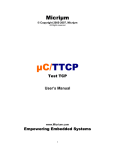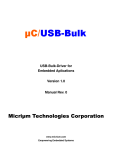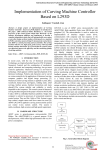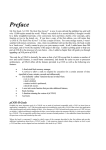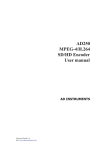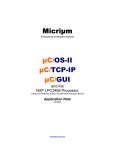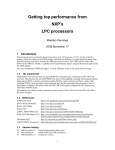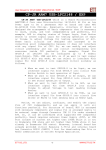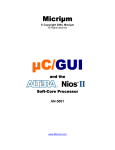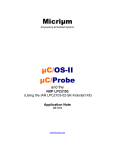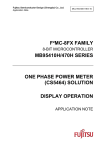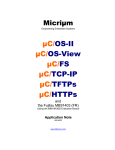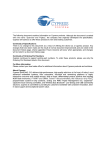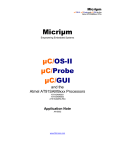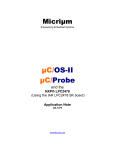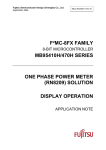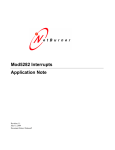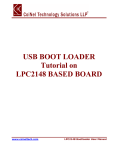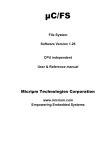Download 開啟原PDF
Transcript
Micriµm
Empowering Embedded Systems
µC/USB-Bulk
and the
Philips LPC2148
Application Note
AN-7148-Bulk
www.Micrium.com
Micriµm
µC/USB-Bulk and the Philips LPC2148
Table of Contents
1.00
1.01
1.02
1.03
1.04
Introduction
The Philips LPC2148
Device-Independent Files
Device-Dependent Files
IAR Embedded Workbench
3
4
5
6
7
2.00
2.01
Enumeration
Configuring your Device
8
8
3.00
3.01
USB Bulk IN Transfers
USB Bulk OUT Transfers
11
11
4.00
app.c
12
References
14
Contacts
14
2
Micriµm
µC/USB-Bulk and the Philips LPC2148
1.00
Introduction
µC/USB-Bulk facilitates USB communication between your embedded device and a host PC
according to the USB 1.1 or USB 2.0 specification. µC/USB-Bulk consists of ANSI C source
code for your embedded processor, as well as a Windows device driver. Some of the features of
µC/USB-Bulk are:
•
•
•
•
A hardware abstraction layer that allows µC/USB-Bulk to be easily ported to different
USB controllers.
Support for bulk transfers, which can utilize a high percentage of bandwidth on the bus.
Data rates as high as 12 Mbit/sec, which is the highest rate supported by the USB 1.1
specification.
OS support. µC/USB-Bulk can be used with single-threaded applications, or with an
RTOS, such as µC/OS-II.
3
Micriµm
µC/USB-Bulk and the Philips LPC2148
1.01
The Philips LPC2148
This document provides guidelines for developing µC/USB-Bulk-based applications for the
Philips LPC2148 microcontroller. The LPC2148, which features an ARM7TDMI-S CPU, includes
a USB device controller that complies with the USB 2.0 specification. Figure 1-1 shows the
LPC2148 on Keil’s MCB2140 Evaluation Board, the platform that was used to test the files
included with this document. These files were developed using IAR’s Embedded Workbench, but
other tool chains can be used to develop applications based on the files.
LPC2148
JTAG
USB
Figure 1-1, The Keil MCB2140 Evaluation Board
http://www.keil.com/mcb2140/
4
Micriµm
µC/USB-Bulk and the Philips LPC2148
1.02
Device-Independent Files
µC/USB-Bulk, like Micrium’s other software modules, is provided in source code form, and it is
compiled along with your application. µC/USB-Bulk’s source code consists of a combination of
device-independent files and files that adapt the software to specific USB controllers. AN-7148Bulk.zip, the file that includes this document, only furnishes the hardware-specific µC/USBBulk files. If you wish to build the example project included in AN-7148-Bulk.zip, you will
need to acquire the device-independent source files for µC/USB-Bulk, as well as those for
µC/OS-II, from Micrium. After you have obtained these files, you should place them in the
folders described below.
\Micrium\Software\uCOS-II\Source
The processor-independent code for µC/OS-II should be placed in this folder. Version
2.81 or newer should be used.
\Micrium\Software\uC-USB\Firmware\USBBulk
µC/USB-Bulk’s device-independent files should be located in this folder. These files,
which are listed below, declare the generic read and write routines that are called by your
application.
USB.h
USB_Private.h
USB_Main.c
USB_Read.c
USB_Setup.c
USB_Write.c
\Micrium\Software\uC-USB\Firmware\Config
µC/USB-Bulk’s configuration files should be placed in this folder. These files define
configuration constants, such as the vendor and product IDs, that allow you to customize
the appearance of your device to the host. The following configuration files are needed:
USB_Conf.h
USB_Descriptors.c
\Micrium\Software\uC-USB\Firmware\System\OS\uCOS-II
This directory contains USB_X_uCOS-II.c, which creates the µC/OS-II objects used by
µC/USB-Bulk.
\Micrium\Software\uC-USB\Driver
The Windows device driver for µC/USB-Bulk should be located in this directory.
\Micrium\Software\uC-USB\SampleApp
This directory holds a sample application, SampleApp.exe, for your PC.
5
Micriµm
µC/USB-Bulk and the Philips LPC2148
1.03
Device-Dependent Files
In addition to the device-independent files listed in the previous section, the example project that
accompanies this document requires several LPC2148-specific files. These files are included in
AN-7148-Bulk.zip, and in order to build the example project, the files must be located in the
folders described below.
\Micrium\Software\uCOS-II\Ports\ARM
This directory contains the µC/OS-II ARM ports.
\Micrium\Software\uCOS-II\Ports\ARM\Generic
This directory holds ‘generic’ ARM ports (i.e. ports that can be used with any target
board).
\Micrium\Software\uCOS-II\Ports\ARM\Generic\IAR
This directory contains the processor-specific µC/OS-II files listed below. These port
files, which are compatible with processors running in ARM or Thumb mode, are
thoroughly described in Application Note AN-1014. This document can be downloaded
from the Micrium Web site.
os_cpu.h
os_cpu_a.s
os_cpu_c.c
os_dbg_c.c
\Micrium\Software\uC-USB\Firmware\System\Device\LPC2148_USB
This directory holds the hardware-specific µC/USB-Bulk files for the LPC2148 USB
device. The two files listed below serve as an interface between the µC/USB-Bulk
device-independent code and the LPC2148 USB controller.
USB_LPC2148_reg.h
USB_hw.c
\Micrium\Software\EvalBoards\Philips\LPC2148-Keil\IAR\OS-USB
This folder contains the LPC2148 source code corresponding to the PC-based sample
application listed in the previous section. This directory contains the following files:
app.c
app_cfg.h
includes.h
os_cfg.h
LPC2148-OS-USB.*
app.c is the actual application, and includes.h is a master include file used by the
application. os_cfg.h and app_cfg.h are configuration files for µC/OS-II and the
application, respectively. LPC2148-OS-USB.* denotes the IAR Embedded Workbench
project files.
\Micrium\Software\EvalBoards\Philips\LPC2148-Keil\IAR\BSP
The Board Support Package for the Keil MCB2140 board resides in this folder.
6
Micriµm
µC/USB-Bulk and the Philips LPC2148
1.04
IAR Embedded Workbench
The IAR Embedded Workbench (EW) V4.30a was used to develop the files included with this
document. You can of course use µC/USB-Bulk and µC/OS-II with other tools. Figure 1-2
shows the project tree for the files included with this document.
Figure 1-2, IAR EW Project
7
Micriµm
µC/USB-Bulk and the Philips LPC2148
2.00
Enumeration
Once you have populated the folders described in sections 1.02 and 1.03, you can use the IAR
Embedded Workbench to build LPC2148-OS-USB.ewp, the project included with this document.
You should be able to build this project with no errors or warnings, and you can run the resulting
executable file using the IAR C-SPY debugger. If the application is running correctly, you will
notice that one of the MCB2140 board’s LEDs rapidly blinks on and off.
The board’s blinking LED indicates that the device is waiting to be enumerated. Enumeration is
the means by which a USB host identifies USB devices, and this process is normally performed
when a device is first connected to a host. Since the MCB2140 board is normally connected to
the host as a means of providing power to the board, the host most likely attempted enumeration
before your application was loaded, and this unwanted enumeration could preclude your
application from receiving the requests that it expects from Windows. For this reason, the
example project utilizes IAR’s flash loader for the LPC2148, allowing you to download the project
to Flash memory, and ensuring that an application capable of enumeration begins executing
whenever the board is connected to a host.
Although this automatic enumeration is desired in a completed USB product, it can cause
problems when you are debugging your device. If, upon connecting the board to a host, the
application loaded from flash even partially completes enumeration, Windows may not attempt to
enumerate the device again when a new application is loaded with C-SPY, leaving you unable to
properly debug the latter application. To prevent this situation, you will either need to load the
Flash memory with a dummy application that does not enable the USB device, or switch to an
external power source that will allow you to connect to the host after the application that you
intend to debug has been loaded.
Once you have chosen a strategy to prevent a previously loaded application from hindering your
debugging process, you should make sure that your application performs the initializations that
will allow it to be enumerated. Mainly, you should ensure that your application invokes
USB_Init(), an initialization function that is called by the provided sample application.
USB_Init() is responsible for setting up the hardware accessed by µC/USB-Bulk, and it
should be called before your application uses any of the µC/USB-Bulk API functions. Your
application also needs to invoke USB_X_Init(), which initializes the operating system objects
needed by µC/USB-Bulk, before USB_Init() is called. After performing these initializations,
your application will be ready to use µC/USB-Bulk’s API functions to send and receive data.
The included sample application indicates the completion of these initializations by ceasing to
toggle the LED that blinks during enumeration.
2.01
Configuring your Device
µC/USB-Bulk provides two configuration files, USB_Conf.h and USB_Descriptors.c, that
allow you to make changes to the information that is provided to the host PC during enumeration.
This information includes the vendor and product IDs, which are represented by the constants
USB_Vendor_ID and USB_Product_ID in USB_Conf.h. The vendor and product IDs are also
defined in USBBulk.inf, which is provided with µC/USB-Bulk and resides on the host PC. If
these ID numbers need to be changed, for example, after a vendor ID is obtained from the USB
Implementers Forum, the appropriate constants must be changed in both files. The µC/USBBulk User’s Manual contains further information about modifying USB_Conf.h and
USBBulk.inf.
8
Micriµm
µC/USB-Bulk and the Philips LPC2148
Along with the vendor and product IDs, the USB host uses the descriptors that it obtains from the
device during enumeration to select an appropriate driver. µC/USB-Bulk defines these
descriptors in USB_Descriptors.c.
This file defines a device descriptor,
USB_acDeviceDescriptor[], which contains general information about the device, as well as
a configuration descriptor, USB_acConfigDescriptor[], which includes information about the
device’s endpoints. USB_Descriptors.c also contains four string descriptors, which are
referenced by the other descriptors.
The descriptors defined in USB_Descriptors.c may need to be edited to allow the hardwarespecific µC/USB-Bulk files to function properly. You should make sure that the declarations in
USB_Descriptors.c match the descriptors listed below, since these descriptors were used to
test the application included with this document. The device descriptor is shown in Listing 2-1,
and USB_acConfigDescriptor[], which defines the configuration descriptor as well as its
subordinate interface and endpoint descriptors, can be seen in Listing 2-2.
Listing 2-1, USB_acDeviceDescriptor[]
const unsigned char USB_acDeviceDescriptor[0x12] = {
sizeof(USB_acDeviceDescriptor),
/* Descriptor length
USB_DESC_TYPE_DEVICE,
/* Descriptor type
USB_STORE_U16(0x110),
/* USB specification number
0x00,
/* Device class
0x00,
/* Device subclass
0x00,
/* Device protocol
0x40,
/*
(1)
USB_STORE_U16(USB_VENDOR_ID),
/*
(2)
USB_STORE_U16(USB_PRODUCT_ID),
USB_STORE_U16(1),
/* Device release number
STRING_INDEX_MANUFACTURER
/*
(3)
STRING_INDEX_PRODUCT,
STRING_INDEX_SN,
0x01
/* Number of configurations
};
*/
*/
*/
*/
*/
*/
*/
*/
*/
*/
*/
L2-1(1)
This field of the descriptor indicates the maximum packet size for Endpoint 0, the
endpoint that is used for the control transfers that facilitate enumeration. A maximum
packet size of 64 bytes is specified, and this value should not be changed unless
corresponding changes are made to the hardware-specific routines that access
Endpoint 0.
L2-1(2)
Through these two fields of the descriptor, the host PC can obtain the product and
vendor IDs defined in USB_Conf.h.
L2-1(3)
These three fields are used to specify a manufacturer name, product name, and
serial number for the device. These fields do not contain the actual values; they hold
references to the string descriptors containing these values. The string descriptors
are defined in USB_Descriptors.c. Like the vendor and product IDs, if these
descriptors are changed, USBBulk.inf must be modified to reflect the changes.
9
Micriµm
µC/USB-Bulk and the Philips LPC2148
Listing 2-2, USB_acConfigDescriptor[]
const unsigned char USB_acConfigDescriptor[9+9+7+7] = {
9,
/* Descriptor length
*/
USB_DESC_TYPE_CONFIG,
/* Descriptor type
*/
USB_STORE_U16(sizeof(USB_acConfigDescriptor)),
/*
(1)
*/
1,
/* Number of interfaces
*/
1,
/*
(2)
*/
0,
/* Configuration string index */
0x80,
/*
(3)
*/
50
0x09,
USB_DESC_TYPE_INTERFACE,
0x00,
0x00,
0x02,
0xFF,
0xFF,
0xFF,
0,
0x07,
USB_DESC_TYPE_ENDPOINT,
0x82,
USB_TRANSFER_TYPE_BULK,
USB_STORE_U16(64),
0,
0x07,
USB_DESC_TYPE_ENDPOINT,
0x02,
USB_TRANSFER_TYPE_BULK,
USB_STORE_U16(64),
0,
/* Interface descriptor
*/
/*
/*
/*
/*
/*
/*
/*
/*
/*
*/
*/
*/
*/
*/
*/
*/
*/
*/
Descriptor length
Descriptor type
Interface number
Alternate settings
(4)
Interface class
Interface subclass
Interface protocol
Interface string index
/* Endpoint 2 IN Descriptor
*/
/* Descriptor length
/* Descriptor type
/*
(5)
*/
*/
*/
/* Polling interval
*/
/* Endpoint 2 OUT Descriptor
*/
/* Descriptor length
/* Descriptor type
/*
(6)
*/
*/
*/
/* Polling interval
*/
};
L2-2(1)
The total length of the configuration descriptor and its subordinate descriptors is
given by this field.
L2-2(2)
This field assigns a numerical value to the configuration set forth by the descriptor. A
USB host can use this value to configure the device via a Set_Configuration
request.
L2-2(3)
This field informs the USB host that the device will be powered by its USB
connection. The maximum amount of current that the device will require is specified
in the subsequent field.
L2-2(4)
The total number of endpoints used, not counting Endpoint 0, is denoted in this field.
L2-2(5)
This field indicates that this endpoint descriptor pertains to Endpoint 2 IN. The next
two fields note that this endpoint will be used for bulk transfers with a maximum
packet size of 64 bytes.
L2-2(6)
This field identifies Endpoint 2 OUT as the subject of this endpoint descriptor. Like
Endpoint 2 IN, Endpoint 2 OUT will handle bulk transfers with a maximum packet
size of 64 bytes.
10
Micriµm
µC/USB-Bulk and the Philips LPC2148
3.00
USB Bulk IN Transfers
Your application can send data to the USB host by calling USB_Write(). This function sends
data using Endpoint 2, and it requires two parameters: a pointer to the buffer holding the data that
will be sent, and the amount of data to send. For example, to send the first 10 bytes of an array
called Test_Array to the host, the following call would be used:
USB_Write(Test_Array, 10);
Since all USB transfers are initiated by the USB host, data sent using USB_Write() will not
actually be transferred to the host until one or more IN packets are received. In fact, because
Endpoint 2 only has 128 bytes of buffer space, calls to USB_Write() with more than 128 bytes
will not return until enough data has been transferred to allow the remaining bytes to be placed in
the buffer. There is basically no limit on how much data can be transferred through a call to
USB_Write(), though, provided that all of the data will ultimately be requested by the USB host.
The constant MAXT_IN, which is defined in USB_Private.h, and should have a value of 64 for
the LPC2148, does not indicate the maximum amount of data that can be transferred with
USB_Write(). This constant instead reflects the maximum number of bytes that are transferred
by USB_HW_SendData(), the hardware-specific function that USB_Write() uses to transfer
data.
3.01
USB Bulk OUT Transfers
USB_Read() can be called by your application to read data that has been received from the
host. This function is analogous to USB_Write(); it takes a pointer to the buffer that will hold
the received data, along with a size parameter. For example, to read 10 bytes from the host into
an array called Test_Array, the following call would be used:
USB_Read(Test_Array, 10);
As with USB_Write(), if a call to USB_Read() is issued and no data has been received from
the USB host, the function will wait for the reception of packets. If, conversely, packets are
received before a call to USB_Read() has been made, these packets will still be available when
the application is prepared to read them. Whether or not packets are received before the call to
USB_Read(), however, the function will not return until all of the requested bytes are received.
11
Micriµm
µC/USB-Bulk and the Philips LPC2148
4.00
app.c
app.c, which is included with this document, is a simple application that you can use to verify
that µC/USB-Bulk is functioning properly. After running the application using the C-SPY
debugger, you should see one of the MCB2140 board’s LEDs blink, indicating that enumeration
is taking place. After enumeration is complete and the LED has stopped blinking, the
application’s only task, which is shown in Listing 4-1, below, calls USB_Read() to receive a
single byte from the host. At this point, you can run SampleApp.exe, the sample application for
your PC. This application will send the requested byte and then wait for the device to send the
byte back, incremented by one. This send and receive process is repeated, and after it has
finished, you should see the message displayed in Figure 4-1.
Listing 4-1, app.c
static void AppTaskStart (void *p_arg)
{
INT8U c;
(void)p_arg;
BSP_Init();
#if OS_TASK_STAT_EN > 0
OSStatInit();
#endif
/*
(1)
*/
/* Initialize the uC/OS-II statistics task
*/
USB_X_Init();
USB_Init();
/*
(2)
/* Initialize the USB hardware
*/
*/
while (USB_IsConfigured() == 0) {
USB_X_Delay(50);
LED_Toggle(1);
}
/* Wait for the device to become configured */
LED_On(2);
while (1) {
USB_Read(&c, 1);
/*
(3)
/* Receive one byte of data from the host
*/
*/
c++;
/* Increment the received byte
*/
USB_Write(&c, 1);
/* Send one byte of data to the host
*/
}
L4-1(1)
BSP_Init() initializes the peripherals used by µC/OS-II. These peripherals
include a Timer/Counter, which serves as µC/OS-II’s tick source, and the Vectored
Interrupt Controller. BSP_Init() also initializes the LPC2148’s PLL to create a
system clock running at 48 MHz.
L4-1(2)
As noted in Section 2.00, Enumeration, USB_X_Init() and USB_Init() must be
called before any µC/USB-Bulk API functions are used.
L4-1(3)
A call to USB_Read() is made with the intention of receiving a single character.
Once this character has been received, it is incremented and sent back to the host.
The sample application on the PC should be used to send and receive characters
anytime after enumeration has completed.
12
Micriµm
µC/USB-Bulk and the Philips LPC2148
Figure 4-1, Successful USB Communication
13
Micriµm
µC/USB-Bulk and the Philips LPC2148
References
µC/OS-II, The Real-Time Kernel, 2nd Edition
Jean J. Labrosse
R&D Technical Books, 2002
ISBN 1-57820-103-9
Embedded Systems Building Blocks
Jean J. Labrosse
R&D Technical Books, 2000
ISBN 0-87930-604-1
Contacts
IAR Systems
Century Plaza
1065 E. Hillsdale Blvd
Foster City, CA 94404
USA
+1 650 287 4250
+1 650 287 4253 (FAX)
e-mail: [email protected]
WEB : www.IAR.com
R&D Books, Inc.
1601 W. 23rd St., Suite 200
Lawrence, KS 66046-9950
USA
+1 785 841 1631
+1 785 841 2624 (FAX)
e-mail: [email protected]
WEB: http://www.cmpbooks.com
Micriµm
949 Crestview Circle
Weston, FL 33327
USA
+1 954 217 2036
+1 954 217 2037 (FAX)
e-mail: [email protected]
WEB: www.Micrium.com
14














